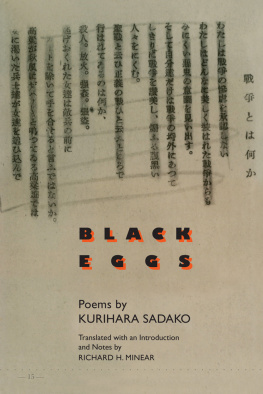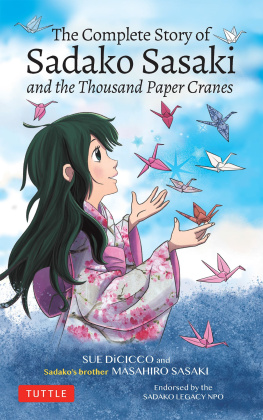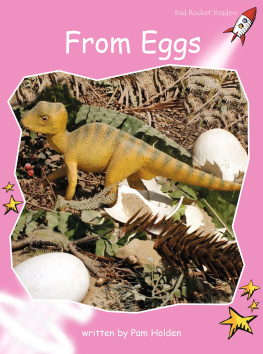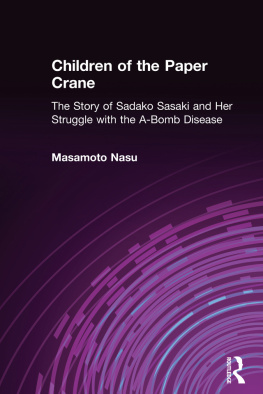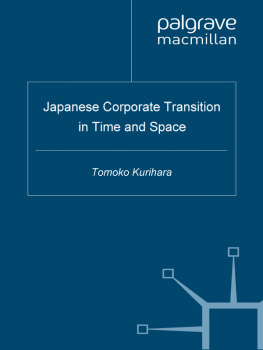Kurihara Sadako - Black Eggs
Here you can read online Kurihara Sadako - Black Eggs full text of the book (entire story) in english for free. Download pdf and epub, get meaning, cover and reviews about this ebook. year: 2020, publisher: University of Michigan Center for Japanese Studies, genre: Art. Description of the work, (preface) as well as reviews are available. Best literature library LitArk.com created for fans of good reading and offers a wide selection of genres:
Romance novel
Science fiction
Adventure
Detective
Science
History
Home and family
Prose
Art
Politics
Computer
Non-fiction
Religion
Business
Children
Humor
Choose a favorite category and find really read worthwhile books. Enjoy immersion in the world of imagination, feel the emotions of the characters or learn something new for yourself, make an fascinating discovery.
- Book:Black Eggs
- Author:
- Publisher:University of Michigan Center for Japanese Studies
- Genre:
- Year:2020
- Rating:3 / 5
- Favourites:Add to favourites
- Your mark:
- 60
- 1
- 2
- 3
- 4
- 5
Black Eggs: summary, description and annotation
We offer to read an annotation, description, summary or preface (depends on what the author of the book "Black Eggs" wrote himself). If you haven't found the necessary information about the book — write in the comments, we will try to find it.
Black Eggs — read online for free the complete book (whole text) full work
Below is the text of the book, divided by pages. System saving the place of the last page read, allows you to conveniently read the book "Black Eggs" online for free, without having to search again every time where you left off. Put a bookmark, and you can go to the page where you finished reading at any time.
Font size:
Interval:
Bookmark:

 Kurihara Sadako with daughter Mariko. 1937. Courtesy of Kurihara Sadako. BLACK EGGS Poems by KURIHARA SADAKO Translated with an Introduction and Notes by RICHARD H. MINEAR CENTER FOR JAPANESE STUDIES UNIVERSITY OF MICHIGAN ANN ARBOR, MICHIGAN 1994 Open access edition funded by the National Endowment for the Humanities/Andrew W. [Kuroi tamago. [Kuroi tamago.
Kurihara Sadako with daughter Mariko. 1937. Courtesy of Kurihara Sadako. BLACK EGGS Poems by KURIHARA SADAKO Translated with an Introduction and Notes by RICHARD H. MINEAR CENTER FOR JAPANESE STUDIES UNIVERSITY OF MICHIGAN ANN ARBOR, MICHIGAN 1994 Open access edition funded by the National Endowment for the Humanities/Andrew W. [Kuroi tamago. [Kuroi tamago.English] Black eggs / by Kurihara Sadako ; translated by Richard H. Minear. xviii, 329 p. 23.5 cm.(Michigan monograph series in Japanese studies; no. 12) Includes translation of her selected later poems. ISBN 0-939512-63-7 1.
Kurihara, SadakoTranslations into English. I. Minear, Richard H. II. Title. Series. Series.
PL855.U66A26 1994 895.615dc20 9331472 CIP This book was set in Palatino and Gill Sans Book design by Judy Stopke Composed by The Composing Room, Grand Rapids, Michigan Printed and bound by Thomson-Shore, Inc. The paper used in this publication meets the requirements of the ANSI Standard Z39.481984 (Permanence of Paper). PRINTED IN THE UNITED STATES OF AMERICA ISBN 978-0-93-951263-8 (hardcover)
ISBN 978-0-47-203816-9 (paper)
ISBN 978-0-47-212763-4 (ebook)
ISBN 978-0-47-290158-6 (open access) The text of this book is licensed under a Creative Commons Attribution-NonCommercial-NoDerivatives 4.0 International License: https://creativecommons.org/licenses/by-nc-nd/4.0/ In the rubble a single wildflower sent out small white blossoms. From the burned soil filled with the bones of fathers, mothers, brothers, relatives, from the now-silent ruins where every living thing burned to death: a small life that taught us to live. Hiroshima, carrying on from that day a flower blooming in the midst of destruction. MARCH 1988 Contents Ground Zero; Hijiyama; Bridges Mountains and River; River of Memory; Flood; Dried-Up River; War; Rivers Rebirth JAPAN LOST THE WAR and then, very quickly, became a great economic power.
Now it has hurt Americas pride by its arrogant pronouncements and by buying up American land, buildings, and culture. Both countries engage in criticizing each otherJapan-bashing, America-bashinga situation that is cause for concern. But I believe that even though each side bashes the other and even though the two governments wish to be linked in military alliance, the citizens of the two countries are bound firmly together in the cause of peace. In preparing this translation, Richard Minear has spared no effort to make available to Americans the desire of Japanese citizens for peace. And when I think of the existencein numbers truly befitting Americaof American intellectuals, poets, and writers, my respect for American democracy and my trust in American democracy deepens, and I can only hope for peaceful and friendly relations between Japan and America. When the atomic bomb was dropped on Hiroshima, the poet Herman Hagedorn wrote The Bomb That Fell on America; the poem was translated into Japanese in 1950.
Because of its length, I will quote only a part. Lord, we have not forgotten Pearl Harbor. We have not forgotten the peace envoys, stalling Roosevelt and Cordell Hull while the planes were already on the way to drop death on our ships and our men.... But we know that more than half of those whom the bomb obliterated at Hiroshima were women and children.... The bomb that fell on Hiroshima fell on America too.... It erased no church, vaporized no public building, reduced no man to his atomic elements.
But it fell, it fell.... Who loosed this terror upon mankind? We know, and the world knows. It is America, the idealist among the nations. The people with the great humanitarian dream... America loosed the bomb that killed a hundred thousand people in Hiroshima and shook the foundations of the world.... Thus Hagedorn laments Americas moral bankruptcy.
But the dropping of the bomb did not happen out of the blue; it was the result of Japans attack on Asia and the Pacific in the fifteen-year war. Whats more, the Allies had issued the Potsdam Proclamation on 26 July 1945 and had given Japan final warning to respond by surrendering unconditionally before 3 August. Even though the war was lost, the Japanese government ignored the Potsdam declaration in the interests of preserving the emperor system. So the dropping of the bomb was both an American act and a Japanese sacrifice in the name of preserving the emperor system. Let me speak briefly about the Gulf War. Despite hopes and actions for a peaceful resolution, the violent acts of a small country were met with a military force that had America at its center.
Destruction and butchery were carried out, and many people were turned into refugees. Former Attorney General Ramsay Clark accused George Bush before the international war crimes tribunal of violating nineteen provisions of international law. Moreover, Bernard Lown, American president of International Physicians Protesting Nuclear War (IPPNW), conducted an on-the-spot investigation during the Gulf War. He reports that high-tech weapons are inhumane and as destructive as nuclear weapons, and that more than one thousand nuclear weapons were deployed in the Middle East. He published the results of his research on the deterioration of American society since President Reagans great arms buildup. He argues that the collapse of the Soviet Union is a question not of socialism or capitalism but of the unproductive arms race, and he warns that America too may soon follow in the footsteps of the Soviet Union.
Charles Overby, emeritus professor at Ohio University, has urged the formation of an American Article 9 Society to support and universalize Article 9 of the Japanese Constitution. He suggests that there can be no world peace unless all countries in the world adopt the principle of renouncing war as in Article 9. We take heart because we have gained a million, ten million allies. I am deeply grateful to the Center for Japanese Studies at the University of Michigan and to Richard Minear for making this volume possible. I hope for growing friendship between Japan and America. KURIHARA SADAKO MAY 1992 I FIRST MET KURIHARA SADAKO in 1983 in Hiroshima.
I was then translating ta Ykos City of Corpses and had gone to Hiroshima to meet tas half-sister, Nakagawa Ichie. That was my first trip to Hiroshimain my twenty-third year as a Japan scholar. (Like many of my colleagues in the field of Japanese studies, I had been avoiding Hiroshima.) When Nakagawa arrived at our meeting, she was accompanied by Kurihara. I had no idea then who Kurihara was. Now I know. I thank her for her willingness to grant me translation rights to her poetry, for her responsiveness to my inquiries, and for her hospitality in Hiroshima in June 1992.
My second major debt is to Yasuko Fukumi. A poet herself and old enough to remember the war years, Fukumi was the ideal person to help me through the many problems I encountered. She went over each poem with me to explore meaning and tone, she wrote Kurihara a series of letters to inquire about poems that were open to more than one interpretation, and she reacted to several drafts of translation. Her admiration for Kurihara reinforced my own. My third major debt is to Christopher Drake. Drake served as the outside reader for the Center for Japanese Studies and then went far beyond that role.
Though busy with his own research, he took long hours to commentvirtually line by lineon my translations. In short, he was a model critic. For readings of the manuscript I thank my parents, Gladys and Paul Minear, who have played a similar role in virtually all my writing, Doris Bargen, and Edwin Cranston. For assistance with the Prange Collection, I thank Frank Joseph Shulman and Hisayo Murakami. For general support I thank Bill and Nancy Doub of
Font size:
Interval:
Bookmark:
Similar books «Black Eggs»
Look at similar books to Black Eggs. We have selected literature similar in name and meaning in the hope of providing readers with more options to find new, interesting, not yet read works.
Discussion, reviews of the book Black Eggs and just readers' own opinions. Leave your comments, write what you think about the work, its meaning or the main characters. Specify what exactly you liked and what you didn't like, and why you think so.

